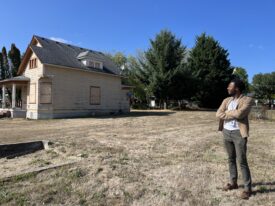At 21, in a sweating, dirt-floor shack on an island in a Nicaraguan lake, I ate a lunch of coarse tortillas and salted beans. My crooked-toothed host, who invited me for the meal when he saw me standing disappointed outside of the sole restaurant in the hamlet (it was closed), peppered me with questions about life in the United States. Soon, he broached the subject that most intrigued him, “Tu tienes tu propio ‘pickup’?” He asked if I had a truck.
The throbbing allure of car ownership—of the personal mobility, even freedom, that it represents—is powerful and pervasive.
His assumption was that since I was American, I had a motor vehicle at my beck and call. At the time, I did not. I was a college student in Ohio, a few weeks away from starting a low-paying job at a global issues think tank in Washington, DC.
But, sure enough, four years later, I bought a used car. It wasn’t a pickup, but still, it was proof of my host’s prescience. I bought it so I could get out of town on the weekends to do a little rock climbing. But within a few months of buying the car, I found all kinds of other uses for it. (Owning a car is an all-you-can-eat meal plan: once you’ve bought it, there’s little reason not to use it.)
Amy and I have owned a car for 16 years straight, right up until February of this year. We’ve lived in families with cars for all but 8 of our 41 years (four of those in college).
We’re hardly experts—after five months without our own auto—in car-less living. (My grandmother, for example, never had a driver’s license her entire life.)
And yet, we’ve drawn media like a porchlight draws moths. (Most recently, the Pioneer Press in Minneapolis-St. Paul ran a column, and the planners’ website Planetizen picked up the story from this blog. Business Week and Plenty have also requested interviews.) And this fact proves nothing so much as how blinkered our national perspective is on vehicles.
Take a wider perspective. Compared to most humans before us and the overwhelming majority of humans now living, we are utter neophytes at living without our own car. It’s not just in poor countries: in cities across Europe and the industrialized parts of Asia—even in New York—a family of five without a car would not be unusual.
Yet in 2006, in the Pacific Northwest, our car-less family of five qualifies as a bona fide human interest story.








brianguenzel
Just wanted to say cheers for trying the car-less experiment. I have goen car less when I could. The 1 mile perimeter is about right in my experience too. In response to your critics/nitpickers I’d say they have the same mentality as hardcore vegans and many in public health. That is an all or nothing attitude. Vegans assume that they actualy eat no meat or that no animal was killed in the process of procuring their veggies and that if you eat any meat it’s bad, but they could suggest just that people eat less meat- win win win for everone and the critters; public health pushes ineffective interventions with stop or die messages when harm reduction maybe more effective; and in your case you have reduced your global foot print greatly, the marginal decrease in pollution, oil consumption, anti-freeze etc is far greater than what the pro rated amount of “mooching” would have cost if you could actually pro rate the ownership of a car.Personaly I am car free again but I rent one on occasion as needed- harm reduction. I also neveer buy new cars as not to contribute to the demand, and buy old cars and fix them to run cleaner than they did before.anywho…
Jan
Brian, I think your analogy to veganism might be offensive to many. I don’t know any vegans who fit the stereotype you so prejudicially present.And yet you have blinders to applying the same argument to Alan’s situation. No offense to Alan—I love what he’s doing—but surely being carless has little impact on the fossil fuel used to produce and transport our food, heat our homes, and run our computers?I think a vegan has a stronger argument that they do not support the killing of animals than a car-less person has that they do not use fossil fuel.That said, keep up the good work, Alan! I cheer you on! Every bit helps!